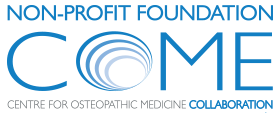Simultaneous translation Spanish-English / English-Spanish will be provided
Pre-Conference Day - September 29, 2017
Pre-conference Workshops (14:00 - 17:00)
| 13:30 | Pre-conference Workshops and Conference Registration |
| 14:00 - 17:00 | Pre-conference Workshops |
| W1 | Swampy and complex: the contribution of qualitative research to the evidence based osteopathy Oliver Thomson |
| W2 | Designing and conducting osteopathic research: formulating a research question Patrick van Dun and Rafael Zegarra-Parodi |
| W3 | Designing and conducting pragmatic searches of the evidence Ivan Solà |
Day 1 - September 30, 2017
Morning session
| 8:30 | Registration |
| 9:00 | Opening Francesco Cerritelli & Gerard Alvarez |
| 9:05 | Welcome Speech Sandra Lois - ROE President |
| 9:15 | COME Collaboration: the research marries the multidisciplinary innovation Francesco Cerritelli |
| 9:30 | COME Spain National Centre - the new reality for osteopathic innovation Gerard Alvarez |
Session 1 - Biomechanics
Biomechanics - the study of the structure and function of biological systems - has always played a prominent role in osteopathy. However throughout the years its original concept and definition has been diverted toward a pure linear mechanistic approach, leaving behind key aspects relevant for the optimisation of clinical practice. This session will explore a renewed vision of biomechanics making available to clinicians and researchers crucial elements useful for a significant improvement of the daily clinical scenario
Moderator: Patrick van Dun
| 9:45 | Are spinal kinematic changes maintained following recovery from injury and pain free return to activity? Paul Bell |
| 10:05 | Clinical biomechanics of soft tissues, including fascia: understanding theory to master practice Walid Salem |
| 10:25 | Spino-pelvic sagittal alignment and back and hip pain prevalence in young elite athletes Carl Todd |
| 10:45 | Q&A |
| 11:05 | Coffee break and poster presentation |
Session 2 - Touch
Given that the sense of touch plays a critical role in osteopathy, this session will explore the potential mechanisms by which stimulation of the skin senses can exert beneficial physiological and psychological effects, aiding growth and development. The session will review a class of low threshold mechanosensitive c-fibre, named c-tactile afferents, which respond optimally to gentle, slow moving touch are likely to play a direct and significant role in the efficacy of manual therapies. Then it will discuss the impact the type and quality of touch plays in therapeutic tactile interventions and in particular the neuroscience underpinning these effects will aid the development of more targeted, population specific interventions.
Moderator: Francesco Cerritelli
| 11:30 | Keynote lecture: The Touch That Matters Most Francis McGlone |
| 12:10 | Exploring the effects of mindfulness informed osteopathy for patients with chronic pain (OsteoMAP) Hilary Abbey |
| 12:30 | Q&A |
| 12:50 | Discussion / round table |
| 13:00 | Lunch |
Day 1 - September 30, 2017
Afternoon workshop session (14:30 - 18:30)
| Workshop 1 | Osteopathic clinical reasoning: decision-making process and adaptive salutogenic treatment based on the five models Christian Lunghi |
| Workshop 2 | The neurobiology of touch applied to the osteopathic practice F. McGlone & F. Cerritelli |
Day 2 - October 1, 2017
Morning session
| 08:50 | Opening Francesco Cerritelli |
| 09:00 | Keynote lecture: Challenges and opportunities in research of non-pharmacological interventions: The case of manual therapy Gerard Urrutia |
| 09:30 | Health Economic Value of Osteopathy (HEVO study) Patrick van Dun |
| 10:00 | Q&A |
Session 3 - Placebo
The placebo effect is a multifaceted neuropsychobiological phenomenon influencing patient’ response to both real and non-real treatment. Non-real or placebo treatment is an “inert” treatment, better defined as an intervention lacking of the active or specific principle to be tested. Placebo treatment is able to influence remarkably outcomes through several neuropsychobiological systems. Although it has been argued the strategic use of placebo to improve outcomes in real clinical scenarios, in research context the placebo phenomenon has an ambivalent value. The aim of the session will be to review the research evidence and contextualise this evidence in the clinical context.
Moderator: Sonia Roura
| 10:10 | Placebo Effect: A Challenge in Clinical Research Antoni Morral |
| 10:30 | Placebo and manual therapies Francesco Cerritelli |
| 10:50 | Ethics, deception in placebo clinical and research Marco Annoni |
| 11:10 | Q&A |
| 11:20 | Coffee Break |
| 11:45 | Abstract presentations |
| The beliefs and attitudes of UK registered osteopaths towards chronic pain and the management of chronic pain sufferers - a cross-sectional questionnaire based survey Roy Macdonald | |
| You have permission to touch me providing you are doing it therapeutically and properly” A qualitative study into the perception of touch in the osteopathy Catherine Roberts | |
| ‘Talking a different language’: a qualitative study of chronic low back pain patients' interpretation of the language used by student osteopaths Oliver Thomson | |
| Osteopathy 2.0 new tech, complexity and osteopathic vision Marco Abbro | |
| Chronic trapezius myalgia (CTM) in computer workers, relation between pain, body image and disability Alexandre Nunes | |
| 12:45 | Q&A |
| 13:00 | Closing ceremony |







